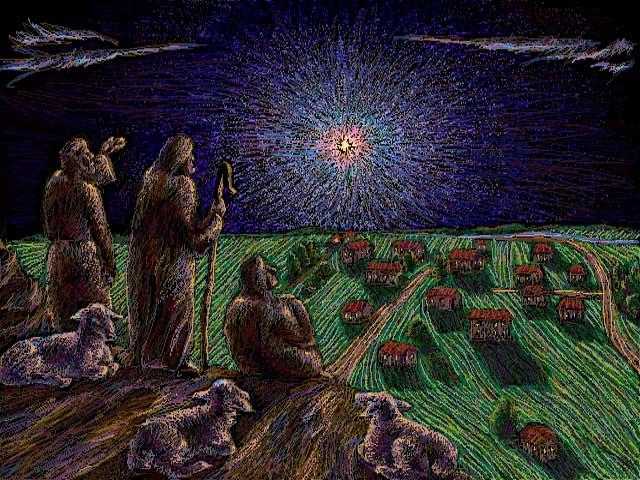Prophecy Historicized vs. History Prophesied
Secular Biblical scholarship is premised on the notion that
prophecy is simply not possible. Thus, if a Bible text contains a recognizable description of
events subsequent to the author's time, why, then, the putative author could not have written it.
Thus we hear of 'Deutero-Isaiah'; since Isaiah is a historic figure contemporary with
Hezekiah, remarks about Cyrus cannot have been written by him. How, after all, can Isaiah possibly
have known anything about Cyrus, a historical figure born centuries later?
Bible believers do not share this assumption. Indeed,
Isaiah marked out as the dividing line between the True God and the pagan nothings, that God knew, and
could communicate to man, the future: "Remember the former things of old, for I am God, and there is no
other; I am God, and there is none like Me, declaring the end from the beginning, and from
ancient times things that are not yet done, saying, 'My counsel shall stand, and I will do all My
pleasure,'..." (Isaiah 46:9-10).
God foreknows not only what will happen, but everything
that could have happened but never did. It seems to be beyond human comprehension how He could
know an infinity of possible worlds, but when you look at scripture, it has to be that way.
First of all, He knows what will be: "Known unto God are all his works from the beginning of
the world." (Acts 15:18).
But not only that, He knows what might have happened...but didn't. For
instance, He answers David, "Then said David, O LORD God of Israel,
thy servant hath certainly heard that Saul seeketh to come to Keilah, to
destroy the city for my sake. Will the men of Keilah deliver me up
into his hand? will Saul come down, as thy servant hath heard? O LORD God
of Israel, I beseech thee, tell thy servant. And the LORD said, He
will come down. Then said David, Will the men of Keilah deliver me
and my men into the hand of Saul? And the LORD said, They will deliver
thee up. Then David and his men, which were about six hundred, arose
and departed out of Keilah, and went whithersoever they could go. And
it was told Saul that David was escaped from Keilah; and he forbare to
go forth." (1 Samuel 23:10-13; Matthew 11:21).
So God told David what people would do...except that they
didn't do it, because forewarned by the prophecy, David skipped town. So His foreknowledge is
so complete as to include those things which would have happened under other circumstances, but never
actually happened. He foreknows all events of all possible worlds.
We, finite creatures bound by time, are like a caterpillar crawling along a twig. Beneath
our myopic gaze lies one little segment; we can only guess at what lies ahead, and reminisce about
what lies behind. But God does not grovel along the twig; He sees the whole complete: the
"end from the beginning".
God's foreknowledge does not in and of itself constrain
anyone, any more than my perceiving that 'You are sitting in your arm chair' constrains you to sit in
the arm chair. To Him, the entire continuum of past, present and future lies open to gaze.
This is precisely what He foreknows, our freely chosen actions: "If then our freedom is
preserved, however vast the number of inclinations it has to virtue or to vice and, again, to what is
becoming or to what is unbecoming, it, along with everything else from creation and from the
foundation of the world will be known to God before it comes to be for what sort of freedom it will
be...And so, God's foreknowledge is not the cause of everything that will come to be, even of our
freedom when we are made active by our own impulse...But if God takes the order for the
governance of the universe from His foreknowledge, then all the more is our individual freedom useful
for the ordering of the world." (Origen, On Prayer, Part One, B. VI.3).
It's a free country, and scholars are certainly entitled
to reject the very possibility of God communicating future events to man. Great caution should be
exercised, however, to avoid circular 'arguments' in which conclusions about dating drawn from the
presupposition that prophecy is impossible are then used to rebut the possibility of prophecy; e.g.,
'Second Isaiah lived contemporaneously with the events he 'prophesied', therefore there is no such
thing as prophecy'. This begs the question, since the theory that there is such a party as
'Deutero-Isaiah' is premised upon the denial that prophecy is possible.
The assumption that prophecy is simply not possible is
indeed widespread in the world of unbelieving Bible scholarship; thus, so far at least the
authors are correct in saying, "The scholarship represented by the Fellows of the Jesus Seminar is
the kind that has come to prevail in all the great universities of the world."
(The Five Gospels, p. 35).
This Copernican Revolution, of making fulfilled prophecy, not into
proof that Jesus is the Messiah as traditionally understood, but rather
that Jesus is a myth, goes back to the founders: "But the first and
last expedients are purely arbitrary; and if in the alleged analogies
there may be some truth, yet it is always incomparably more probable
that histories of cures of the lame and paralytic in accordance with
messianic expectation, should be formed by the legend, than that they
should really have happened." (David Friedrich Strauss, The Life of
Jesus Critically Examined, p. 457). In other words, if we read in the gospels that the lame walk,
fulfilling Isaiah 35:6, we are not entitled to infer that Jesus is the
Messiah, rather only that it never happened, because it was prophesied.
The lame walking is no doubt a supernatural occurrence, above the
normal daily round, and the atheists refuse to believe any such report.
Fulfilled prophecies wink out, unmasked as fiction.
But this will become downright nutty at the hands of the 'Fellows,' as
events in no way supernatural nor even unlikely are likewise declared
fictional.
But wait — the Fellows of the Jesus Seminar are fully
prepared to take it to the next level! Not only can prophets have no special insight into the
future, but actual historic events cannot correspond with prophesy even by
coincidence, nor by intent. So, the manner of Christ's entry into Jerusalem having
been prophesied, Jesus cannot have so entered Jerusalem, even though there's nothing supernatural
about it at all: "Entry into Jerusalem. The account of Jesus' entry
into Jerusalem is based on Zech 9:9 and Ps 118:26. The story was conceived to fit the prophecies."
(The Five Gospels, p. 228). It strains credulity that a man should ride on
an ass? A common mode of transport in the day? Why would not a man who thinks he is the Messiah be consciously
patterning his behavior in accordance with the prophecies?
This seems to be a generalization of the principle, 'A
watched pot never boils.' It's the same type of magical thinking people employ when they say, 'It
didn't rain because I brought my umbrella'. It's as if my saying, 'The Yanks will win the
World Series', will 'jinx' them so that they cannot win the World
Series, though this otherwise is not an impossible nor a supernatural outcome. The Fellows of
the Jesus Seminar actually believe that, Christ's humble entry into Jerusalem having been prophesied,
He cannot have so entered Jerusalem...even though that's actually a more
economical alternative to entering the city on a richly caparisoned war-horse!
People who find some discernible measure of 'rationality' in these
measures have not thought the matter through. A better saying, "Prophecy
is history unfulfilled, and history is prophecy fulfilled."
(Dwight L.
Moody, How to Study the Bible, Kindle location 446).

|


